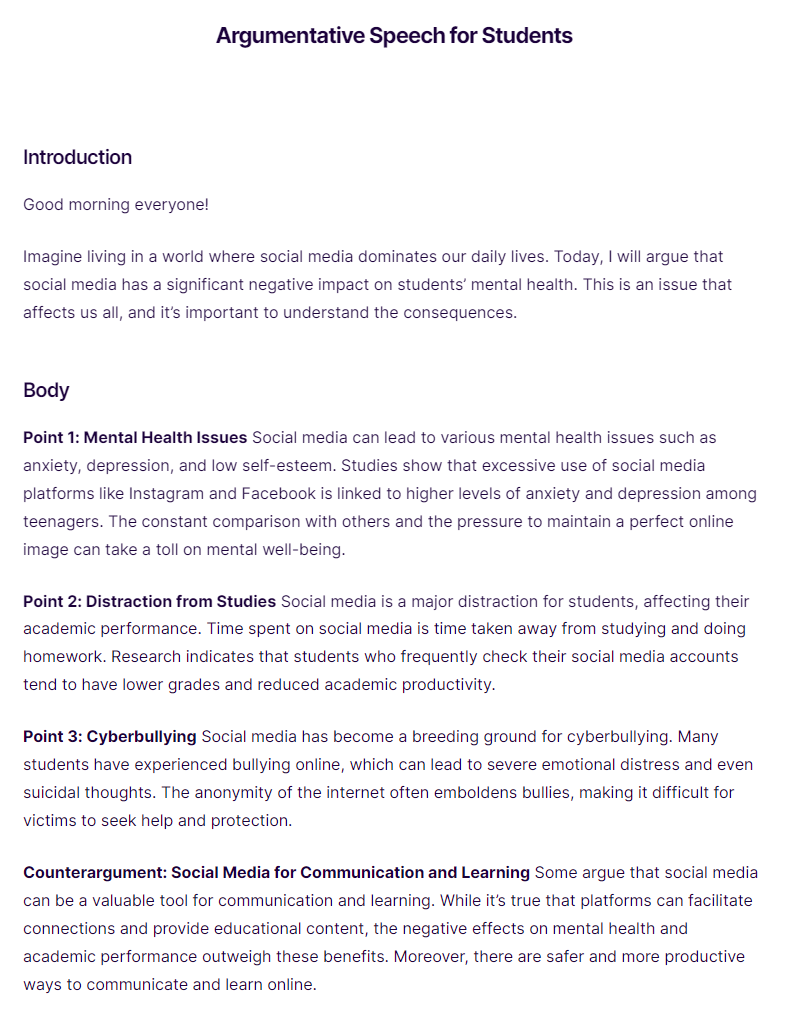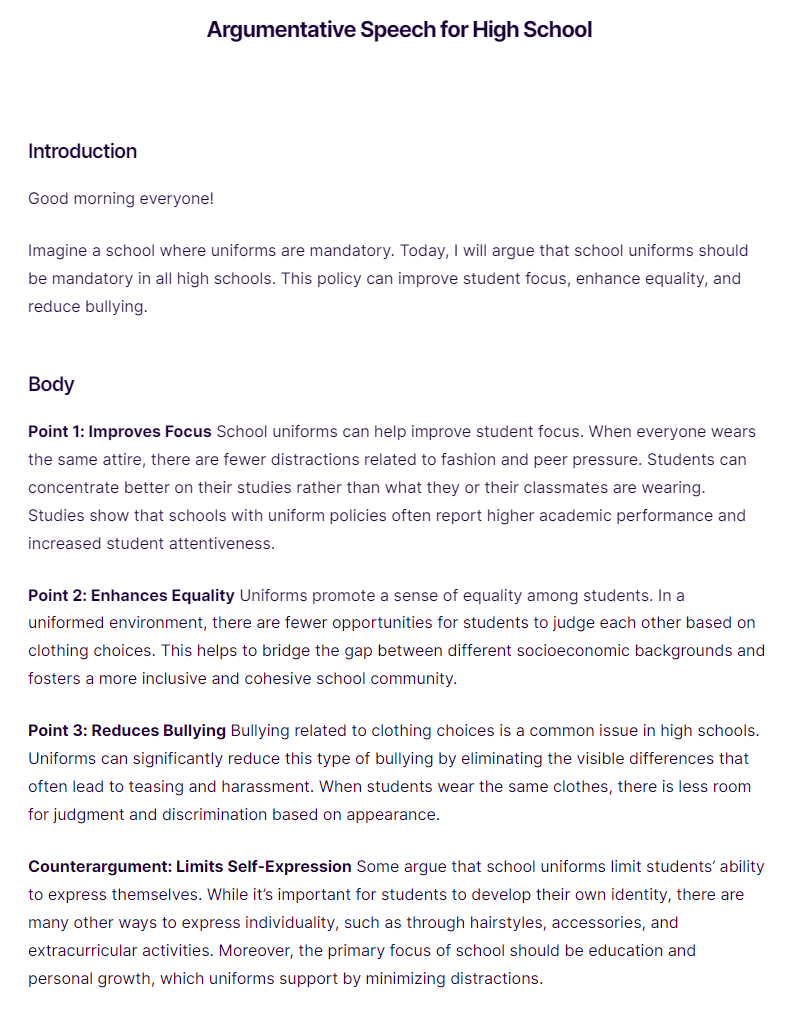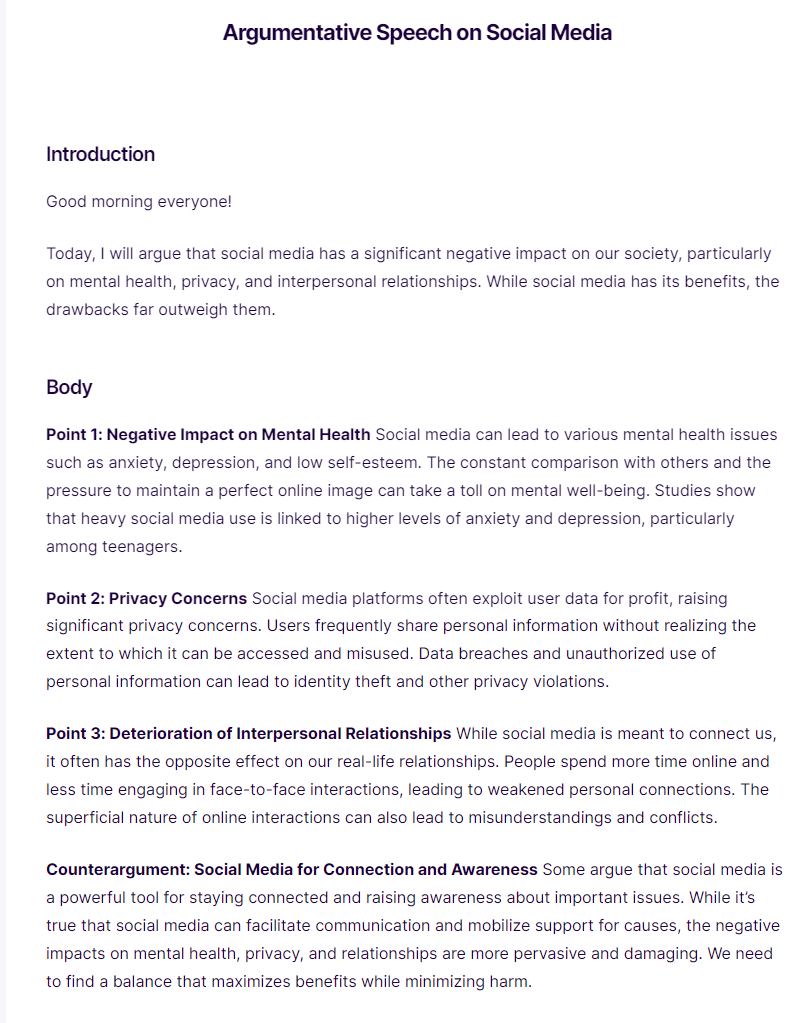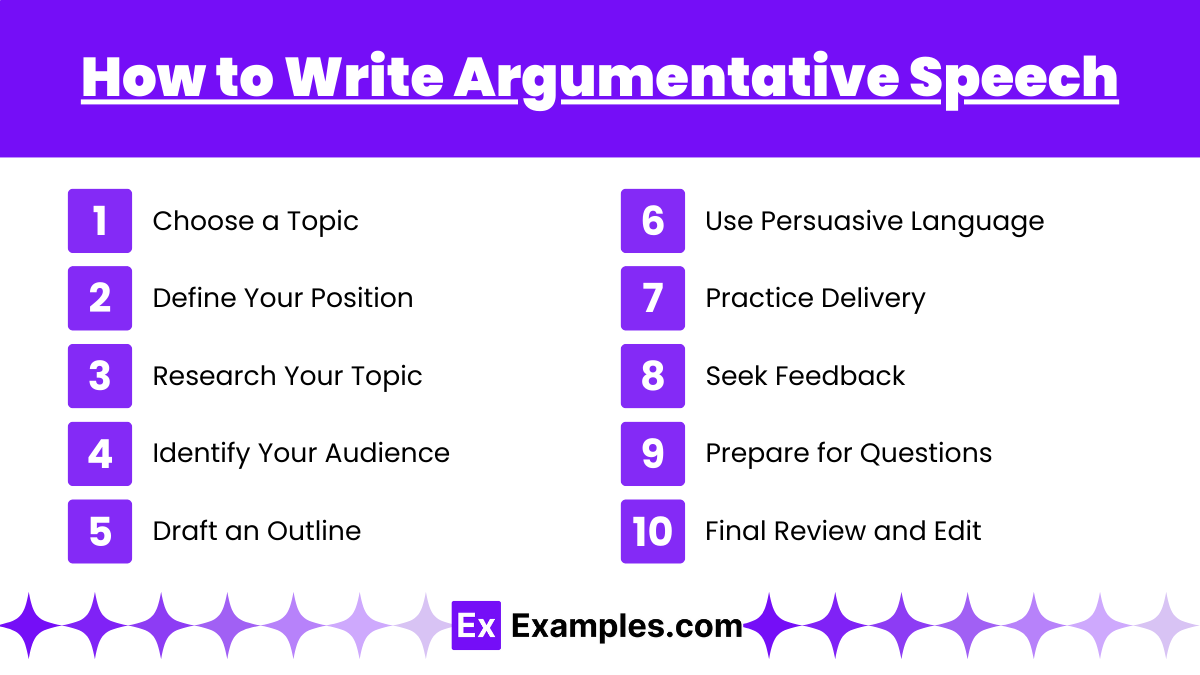15+ Argumentative Speeches Examples to Download
“Everyone who posts their own opinion is like an expert already.” Take for the example the most recent Philippine national elections. It consisted of five different parties who had their own agenda and own candidate running for president. Months before the elections took place, people have taken up to social media to voice out their opinions on which candidate is the most preferable candidate that would bring the needed change that the Philippines would like to see. Eventually, Rodrigo Duterte won the majority of the vote and remains as the nation’s president until today. You may also see argumentative writings.
Just like persuasive speaking, the goal of argumentative speeches is not giving an audience a wake-up call, but this type persuasive speech attempts to persuade the audience to alter their viewpoints on a controversial issue. Argumentative speeches aim to radically the opinions already held by the audience. This type of speech is extremely challenging; therefore, the speaker should be careful to choose a topic which he or she feels prepared to reinforce with a strong argument.
What is Argumentative Speech?


Argumentative Speech Bundle Download
Argumentative Speech Format
1. Introduction
Hook: Capture the audience’s attention.
Thesis Statement: Clearly state your main argument.
Preview: Briefly outline the main points.
2. Body
Point 1: Present your first major point with supporting evidence.
Point 2: Present your second major point with supporting evidence.
Point 3: Present your third major point with supporting evidence.
Counterarguments: Address and refute opposing viewpoints.
3. Conclusion
Summary: Summarize the main points.
Restate Thesis: Reinforce your thesis in light of the evidence.
Call to Action: Encourage the audience to take a specific action or adopt your viewpoint.
Argumentative Speech Example
Short Argumentative Speech Example
Argumentative Speech for Students

Argumentative Speech for High School

Argumentative Speech on Social Media

More Argumentative Speech Topics
- Argumentative Speech for Students
- Argumentative Speech for High School
- Argumentative Speech on Social Media
- Argumentative Speech about Education
- Argumentative Speech about Bullying
- Argumentative Speech on Social Issues
Uses of Argumentative Speech
- Debates: In formal debates, participants use argumentative speeches to present their stance on a given topic. They aim to convince judges and the audience by presenting well-structured arguments, backed by evidence and logical reasoning, while refuting the opposing side’s points.
- Political Campaigns: Politicians use argumentative speeches to persuade voters to support their policies and candidacy. By addressing key issues, presenting solutions, and countering opponents’ arguments, they aim to garner public support and win elections.
- Legal Proceedings: Lawyers use argumentative speeches in courtrooms to advocate for their clients. They present evidence, construct logical arguments, and address counterarguments to persuade the judge or jury to rule in their favor.
- Public Policy Advocacy: Activists and advocates use argumentative speeches to promote policy changes. They present data, personal stories, and logical arguments to persuade lawmakers and the public to support their cause.
- Academic Settings: Students use argumentative speeches in classroom debates and presentations to develop critical thinking and persuasive skills. These speeches help them learn to construct logical arguments and defend their viewpoints effectively.
- Business Presentations: In the business world, professionals use argumentative speeches to persuade stakeholders, investors, or clients to support projects, investments, or business strategies. By presenting clear arguments and evidence, they aim to influence decision-making.
- Social and Community Issues: Community leaders and activists use argumentative speeches to address social issues and mobilize support for community initiatives. They aim to raise awareness, change public opinion, and encourage collective action.
- Environmental Advocacy: Environmentalists use argumentative speeches to promote sustainability and conservation efforts. They present scientific data and logical arguments to persuade the public and policymakers to take action on environmental issues.
- Educational Outreach: Educators and speakers use argumentative speeches to inform and persuade audiences about important topics, such as health, safety, and social justice. These speeches aim to educate and inspire change.
- Media and Journalism: Journalists and media personalities use argumentative speeches in opinion pieces and editorials to influence public opinion. They present well-reasoned arguments on current events and issues to persuade their audience.
Making Claims in Argumentative Speaking
In developing a good argumentative speech, it is crucial to have solid claims and basis for your arguments. Taken from Speech Communication, Raymond S. Ross clarifies the following definitions present in an argumentative speech:
Claim: The whole reason for your arguing in the first place. This is based on your opinion.
Grounds: This is purely based on research. Facts, tables, statistical data, proof of evidence. If you have no grounds to support your claims whatsoever, you will be seen as an ignorant blabbermouth just stating random things without proof. You may also see speech examples.
Argumentative speeches can be based on the following: a claim of fact, a claim of value, or a claim of policy.
A claim of fact starts with an incident or a reality that is based on evidence.
A claim of value is a belief that something is good or bad, right or wrong.
A claim of policy is a claim that recommends the course of action.
Argumentation requires a firm stand on the positive or a negative side of the said issue. After all, the goal is not to win over your audience, but to dominate the argument as it requires the speakers to not only present their side of the issue, but to also present it with substantial evidence in making the said claim. Argumentative speaking can be carried out in debates. You may also see motivational speech.
As you organize your said speech, you should have your strongest arguments at the first and the last sentence of your speech. First impressions among the audience are just as important as your closing statement directed to them. It is also important to avoid personal attacks. If you believe in “karma”, that’s exactly what’s going to happen to you once you engage in a fight with someone. After all, what goes around comes around. You may also see appreciation speech.
Once you start with derogatory remarks and baseless accusations will eventually discredit you as a speaker and you will lose the trust of your audience. Get straight to the point and make use of practicalities in your speech. Don’t beat around the bush too much otherwise, you will lose the interest and the impact you might have with the crowd. You may also see welcome speech.
Essential Components of an Argumentative Speech:
With the dominating over the argument as the main goal of an argumentative speech in the first place, it is important to understand the components that encompass the said speech in the first place. Listed below are four essential parts of an argumentative speech:
1. Find for a debatable topic
Although it can really be just any topic, make sure that it clearly has both the affirmative and negative side to remain impartial and unbiased to just a single viewpoint. For example, do pineapples really go on pizza?
2. Pick a side
If you have the option to pick a side, that is great as you have picked with a side that is most suited to your beliefs and perceptions about that certain issue. But if not, you will just have to stick with what is given to you and make the most of it. Once you stick with that certain side, make sure to provide all related information surrounding that issue, otherwise, it would confuse the audience on what side you truly belong to. You may also see appreciation speech.
3. Give some supportable arguments
Research, research, research! And afterwards, conduct more research and verify the gathered data. It cannot be simply your opinions alone, you have to try to include the opinions of other people as well, what other people have to say about it, by providing figures and data that is relevant. Nobody likes an unsupported argument with baseless hearsay. You may also welcome speech.
4. Refute alternate positions
When an argument is being thrown at you, you learn to throw one back. Are you just going to let the opposing party trample over your side of the argument like a powerless ant? Or, are you going to put up a fight by throwing in arguments of your own? In doing so, you have to provide supporting facts that support your argument. You may also see leadership speech.
How to Write Argumentative Speech

- Choose a Topic: Select a topic that you are passionate about and that has clear opposing viewpoints.
- Define Your Position: Clearly state your position on the topic right from the beginning, making sure it’s debatable and not just a statement of fact.
- Research Your Topic: Gather data, statistics, and factual evidence from credible sources to support your position. Ensure you have enough evidence to back up each point you will make.
- Identify Your Audience: Understand who your audience is, their prior knowledge of the topic, their biases, and their expectations. This will help you tailor your speech to their perspective and level of understanding.
- Draft an Outline: Organize your main points and supporting evidence into a structured outline. This should include an introduction, body paragraphs, and a conclusion.
- Introduction: Start with a hook to grab attention, provide background information, and state your thesis (the main argument).
- Body Paragraphs: Each paragraph should cover a single point that supports your thesis. Include evidence and explain how it relates to your argument. Consider addressing and refuting counterarguments.
- Conclusion: Summarize the key points made, restate your position in a stronger way, and perhaps end with a call to action or a thought-provoking question.
- Use Persuasive Language: Choose words that are strong and convincing but remain respectful to opposing views. Use rhetorical questions, metaphors, and similes to make your argument more appealing.
- Practice Delivery: The effectiveness of your speech heavily depends on how you deliver it. Practice your speech multiple times, work on your intonation, pace, and gestures to make your delivery engaging and dynamic.
- Seek Feedback: Before the final presentation, seek feedback from peers or mentors. They can provide insights on your argument’s clarity and the persuasiveness of your speech.
- Prepare for Questions: Be ready to answer questions or criticisms from your audience. This preparation will help you appear more knowledgeable and confident.
- Final Review and Edit: Review your speech to ensure all points are clear and well-supported. Edit for clarity, coherence, and to strengthen your argument.
Tips for Delivering an Argumentative Speech
- Maintain Strong Eye Contact: Engage with your audience by looking them in the eyes. This builds trust and shows confidence in your stance.
- Use Appropriate Tone and Volume: Adjust your tone and volume based on the content of your speech and the reaction of the audience. Emphasize key points with a strong, confident tone and use pauses effectively to let important ideas resonate.
- Incorporate Gestures: Use hand gestures and body language to emphasize points and add energy to your delivery. This makes your speech more engaging and helps to convey your emotions and passion.
- Practice Your Timing: Be mindful of the timing of your speech. Practice delivering your speech to ensure that it fits within the allotted time and that your points are conveyed succinctly without rushing.
- Handle Counterarguments Gracefully: Be prepared to address counterarguments calmly and respectfully. Show that you have considered different viewpoints and use evidence to reinforce why your position remains strong.
- Conclude with Impact: End your speech with a strong conclusion that reinforces your argument and leaves a lasting impression. Consider a call to action or a powerful quote that encapsulates your main points.
FAQs
Why is an argumentative speech important?
It develops critical thinking, persuasive skills, and the ability to present and defend a viewpoint logically.
How do you choose a topic for an argumentative speech?
Choose a topic that is controversial, interesting, and has sufficient evidence available to support your argument.
What are the key components of an argumentative speech?
An argumentative speech includes an introduction, clear thesis, body with supporting evidence, counterarguments, and a conclusion.
How do you structure an argumentative speech?
Begin with an introduction, state your thesis, provide evidence and reasoning in the body, address counterarguments, and conclude effectively.
What makes a strong thesis statement in an argumentative speech?
A strong thesis is clear, specific, and presents a debatable stance that guides the direction of your speech.
How do you gather evidence for an argumentative speech?
Use reliable sources such as academic articles, books, reputable websites, and expert opinions to gather evidence.
Why is addressing counterarguments important?
Addressing counterarguments strengthens your position by demonstrating awareness and refuting opposing viewpoints.
How do you refute counterarguments in an argumentative speech?
Refute counterarguments by presenting evidence and logical reasoning that disproves or diminishes the opposing viewpoints.
What role does the introduction play in an argumentative speech?
The introduction grabs attention, introduces the topic, and states the thesis clearly.
How do you conclude an argumentative speech?
Summarize key points, restate the thesis in light of the evidence presented, and end with a strong closing statement.



